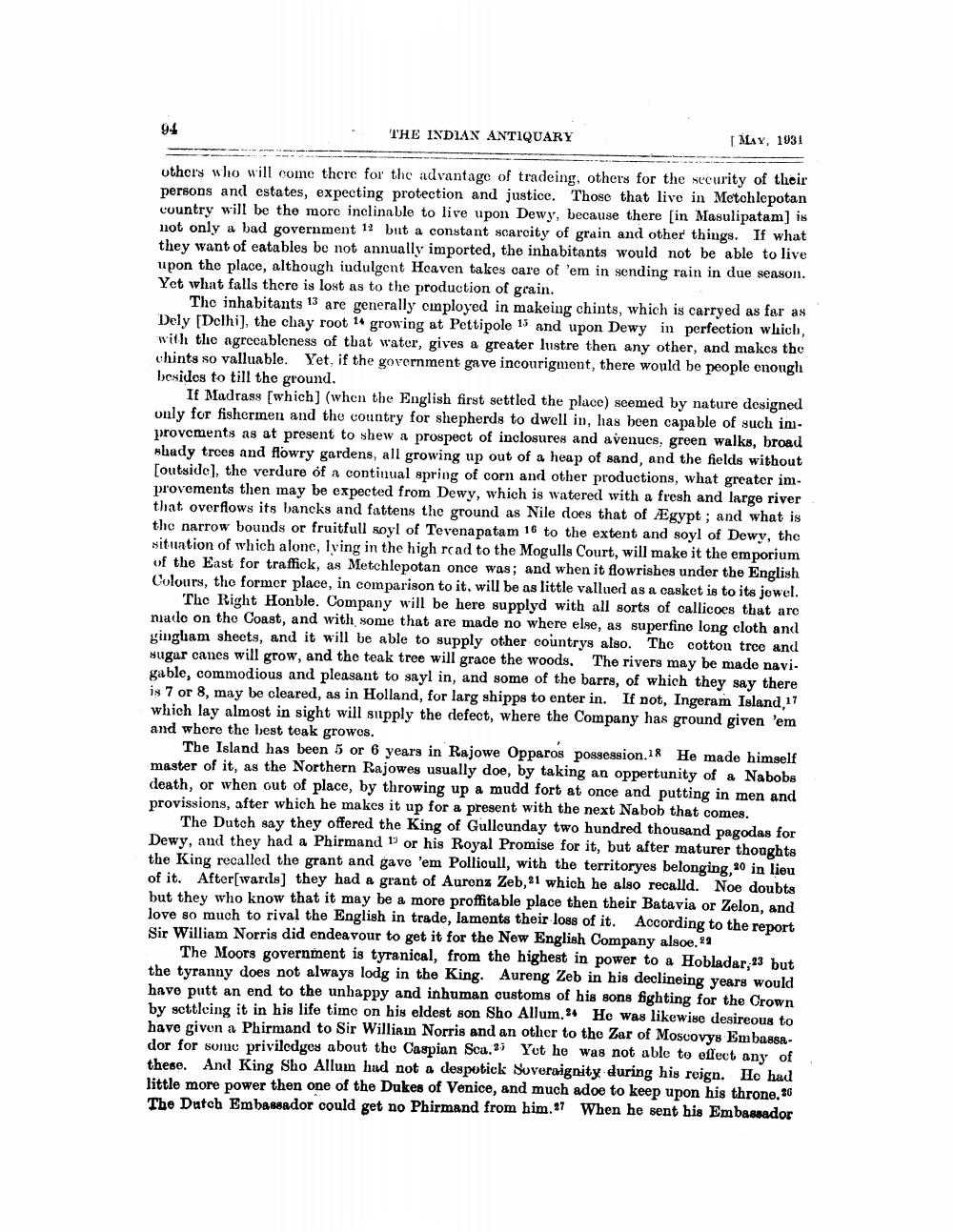________________
THE INDIAN ANTIQUARY
MAY, 1931
others who will come there for the advantage of tradeing, others for the security of their persons and estates, expecting protection and justice. Those that live in Metchlepotan country will be the more inclinable to live upon Dewy, because there [in Masulipatam) is not only a bad government 12 but a constant scarcity of grain and other things. If what they want of eatables be not annually imported, the inhabitants would not be able to live upon the place, although indulgent Heaven takes care of 'em in sending rain in due season. Yet what falls there is lost as to the production of grain.
The inhabitants 13 are generally employed in makeing chints, which is carryed as far as Dely (Delhi), the chay root 14 growing at Pettipole 15 and upon Dewy in perfection which, with the agreeableness of that water, gives a greater lustre then any other, and makes the chints so valluable. Yet, if the government gave incourigment, there would be people enongh besides to till the ground.
If Madrass (which) (when the English first settled the place) seemed by nature designed only for fishermen and the country for shepherds to dwell in, has been capable of such improvements as at present to shew a prospect of inclosures and avenues, green walks, broad slady trees and flowry gardens, all growing up out of a heap of sand, and the fields without [outside), the verdure of a continual spring of corn and other productions, what greater improvements then may be expected from Dewy, which is watered with a fresh and large river that overflows its bancks and fattens the ground as Nile does that of Ægypt; and what is the narrow bounds or fruitfull soyl of Tevenapatam 16 to the extent and soyl of Dewy, the situation of which alone, lving in the high road to the Mogulls Court, will make it the emporium of the East for traffick, as Metchlepotan once was; and when it flowrishes under the English Colours, the former place, in comparison to it, will be as little vallued as a casket is to its jewel.
The Right Honble. Company will be here supplyd with all sorts of callicoes that are nadle on the Coast, and with some that are made no where else, as superfine long cloth and gingham sheets, and it will be able to supply other countrys also. The cotton tree and sugar canes will grow, and the teak tree will grace the woods. The rivers may be made navi. gable, commodious and pleasant to sayl in, and some of the barrs, of which they say there is 7 or 8, may be cleared, as in Holland, for larg shipps to enter in. If not, Ingeram Island, 17 which lay almost in sight will supply the defect, where the Company has ground given 'em and where the best teak growes.
The Island has been 5 or 6 years in Rajowe Opparos possession.18 He made himself master of it, as the Northern Rajowes usually doe, by taking an oppertunity of a Nabobs death, or when out of place, by throwing up a mudd fort at once and putting in men and provissions, after which he makes it up for a present with the next Nabob that comes.
The Dutch say they offered the King of Gullounday two hundred thousand pagodas for Dewy, and they had a Phirmand 1 or his Royal Promise for it, but after maturer thoughts the King recalled the grant and gave 'em Pollicull, with the territoryes belonging, 20 in lieu of it. Afterwards) they had a grant of Auronz Zeb, 21 which he also recalld. Noe doubts but they who know that it may be a more proffitable place then their Batavia or Zelon, and love so much to rival the English in trade, laments their loss of it. According to the report Sir William Norris did endeavour to get it for the New English Company alsoe. 29
The Moors government is tyranical, from the highest in power to a Hobladar,23 but the tyranny does not always lodg in the King. Aureng Zeb in his declineing years would havo putt an end to the unhappy and inhuman customs of his sons fighting for the Crown by settleing it in his life time on his eldest son Sho Allum. 24 He was likewise desireous to have given a Phirmand to Sir Willian Norris and an other to the Zar of Moscovys Embassador for some priviledges about the Caspian Sca.21 Yet he was not able to effect any of these. And King Sho Allum had not a despotick Suveraignity during his reign. He had little more power then one of the Dukes of Venice, and much adoe to keep upon his throne. 26 The Dutch Embassador could get no Phirmand from him.27 When he sent his Embassador




